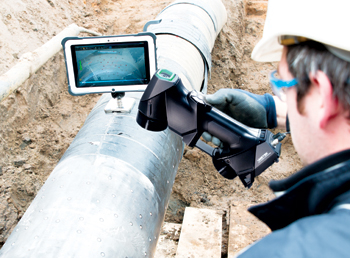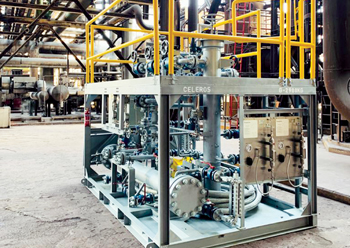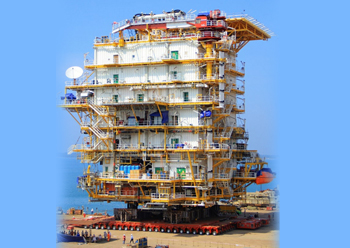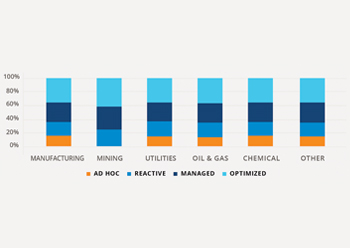
Operators want to do critical maintenance while plants are online to avoid losing production capacity, and IGS TUFFss Online TSA could be the safest way to handle online maintenance with blasting, TSA, or other coatings, writes Bo Andersen of IGS
In the past, thermal sprayed aluminium (TSA) applications were performed during turnarounds, disrupting schedules and other activities due to noise, possible TSA fumes, and abrasive blasting.
Plant operators were forced to make tradeoffs between turnaround duration and asset integrity as the amount and location of surfaces protected by TSA in turnarounds are limited.
But in the past years, there has been a higher demand for prolonged TSA application outside of the turnarounds. Equipment within many refineries, petrochemical plants, and other facilities is now a lot older. Pipes, vessels, and other process equipment face rapid deterioration of their original non-optimal corrosion protection.
 |
IGS TUFFs Online TSA completed application |
Maintenance and operations managers are under pressure to increase the maintenance speed not to lose many production facilities or, at least, the production capacity. Thus, they look at doing the critical maintenance while the plant is online; in other words, without shutting it down. That way, they will be able to reach their maintenance goal and maintain uptime simultaneously.
There are concerns about hot-work such as welding, abrasive blasting, and the open flame of TSA application in many locations around the world. Temperature and humidity also need to be controlled to reach the optimal environment for the TSA application. These concerns apply to both colder areas, such as Canada, Alaska, The North Sea, Northern Russia, and high temperature/humidity areas like the Middle East, Singapore, and West Africa.
Hot-work that may produce sparks or open flames can be dangerous due to the risk of explosion, fire, and the release of poisonous gasses. It can be hazardous for personnel, equipment, and the entire plant.
IGS TUFFSS ONLINE TSA SOLUTION
Large national and international petrochemical companies have been actively looking for a safer TSA solution, which can be applied while the plant is in operation.
Royal Dutch Shell, a British-Dutch multinational oil and gas company, has initiated a project with TUFFss, a leading provider for a safe hot-work environment, to develop a safer online TSA solution.
TUFFss has since been acquired by Integrated Global Services (IGS), a global turnkey thermal spray cladding provider. IGS was chosen to join this project due to its lasting experience in the field of thermal spray.
 |
CUI problem area on piping |
IGS is the sole provider of a proprietary High Velocity Thermal Spray (HVTS) alloy cladding technology, specifically designed for the protection of mission-critical equipment, including pressure vessels and boilers.
Furthermore, IGS HVTS is applied in situ, whereas the majority of thermal spray applications take place in workshops. To enable the HVTS application in the field, IGS has successfully optimised its materials, conveyancing technology, and application procedures. Could the same be done for TSA?
For TSA to be safely applied online, several issues would need to be resolved, including process-specific safety procedures, temperature, and humidity.
Following two years of intensive R&D work, a safer online TSA solution was introduced.
Bo Andersen, who has been instrumental in the development of this new technology, said: "The solution included enhanced TSA application processes and procedures, sealed safety enclosures, humidity and temperature control, (negative) environmental pressure control, and a fully automated safety shutdown system for the TSA and abrasive blasting processes. Everything was custom-made and combined in ways unheard of, meeting the highest standards in the industry."
SAFETY FIRST
The IGS TUFFss Online TSA solution is the safest way ever to handle online maintenance with blasting, TSA, or other coatings. This is made possible with a proprietary Automatic Shutdown System.
This emergency shutdown system continuously monitors the entire work area and surroundings. The system will give digital, audible, and visual warnings in case of leak of gasses, pressure loss, or any other parameter deviation.
This, in turn, enables almost instantaneously automatic termination of any work and equipment inside or outside the habitat, including, but not limited to, welding, grinding, power, grit/sandblasting, TSA, HVAC, dust collection, etc. All equipment is controlled through the use of electrical connections, solenoid valves, and pneumatic connections.
PILOT LNG PLANT PROJECT
Established in 1989, NLNG, an LNG facility in Nigeria, currently has six trains. The plant has a total production capacity of 22 million tons per annum (mtpa) of LNG and 5 mtpa of natural gas liquids (NGLs), which equals 6 per cent of the global market.
Located in a hot, humid, and very salty environment, piping at this facility is prone to corrosion. Various kinds of paint and insulation have initially been used for corrosion protection.
After 20 years in service, corrosion under insulation (CUI) has turned into a significant problem with many pipes about to burst. Ignoring the problem or an insufficient solution could result in fire, explosion, environmental damage, loss of life, loss of profit, or production loss.
One option was to repaint the piping with the same or similar paints and coatings that have already failed once. Some new technology paints and coatings were also being considered. These paints would still need to be inspected and usually reapplied every 5-10 years.
Thermal Spray Aluminium (TSA) was an optimum solution due to its long inspection cycle (more than 20 years), and proven reliability.
TSA coatings applied in traditional ways without environmental controls would not be practical in this case.
The scale of the work in total exceeded 360,000 sq m. Applied during turnarounds, it would have taken over 30 years to protect all corroded piping. The plant would not have lasted 30 years in its present condition.
The plant needed a solution that could be applied while the plant is live. The application would need to be climate-controlled during surface preparation and TSA application, with all grit and dust contained.
IGS TUFFss Online TSA pilot project was first completed on train No 1. The scope included a 50-m column and a two-level platform with two heat exchangers/reboilers. IGS TUFFss Online TSA was applied to a total area of 700 sq m on cold and hot surfaces.
The onsite project was carried out in adverse weather conditions, including heavy rain, thunder, sandstorms, high temperature, and high humidity.
This project succeeded in meeting and exceeding objectives by rigidly following all safety guidelines. The project utilised specially designed Habitats to enable weather protection, climate, humidity, and pressure control.
It was now confirmed without a doubt that it is possible to do the encapsulated TSA maintenance in a live environment, which will be of great importance to NLNG in the future as the work continues on the remaining six trains.
CONCLUSION
As equipment within refineries, petrochemical plants, and other facilities continues to age, the demand for maintenance solutions that can be applied all year round is growing. Plant operators are looking to companies like IGS to utilise their global footprint and experience to deliver innovative solutions safely and efficiently.
Preventing shutdowns and providing the work outside of turnarounds eases the pressure off the maintenance and operations teams, who can continue production while crucial maintenance work is being simultaneously carried out.
Further IGS TUFFss Online TSA projects are now being commissioned within refineries and petrochemical sites, paving the way for more uptime in aging facilities.






















































































